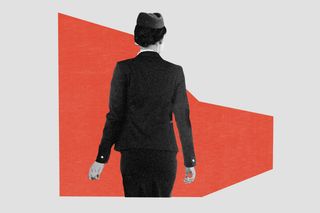
A Passenger Called a Flight Attendant a ‘Servant’ — But the Service Industry Is Complicit Too
The incident shows how the service industry’s approach of prioritizing customer satisfaction is rooted in exploitation.

This week, a video captured a man on an IndiGo flight calling a flight attendant a “servant.” The flight attendant was seen fighting back — telling the man that he could not talk to the crew that way, and that his behavior made other crew members cry. The incident speaks to a pervasive assumption about women working as flight attendants wherein their work is devalued — unfortunately, the service and hospitality industry is complicit in building this assumption.
Airlines, in particular, have had a long history of sexualizing and objectifying air hostesses in advertising — literally, to incentivize travelers to fly their airline in order to see beautiful women. There were reams of restrictions imposed upon who is eligible for the position: unmarried, thin, often fair women. There were, and continue to be, strict norms around grooming — glasses or chipped nail polish could lead to penalties.
“Thus, the trope of the slim, shiny and unmarried flight attendant was perpetuated by airlines until it solidified into an avatar of cultural femininity — always desirable and seemingly available,” The Swaddle noted in 2019. Indirectly, the culture that the airline industry fostered around service work was that it was always geared toward maximizing customer satisfaction, and flight attendants existed to be pleasing in every possible manner. This isn’t just an archaic trope — just this week, Indian carrier Spice Jet posted a photograph of their flight attendants with actor Dharmendra, referring to the former as “red hot girls.”
“If someone doesn’t do her makeup properly, then a majority of [the] crowd will start tweeting that the crew isn’t presentable enough… They’ll complain that they’re paying such amounts to see pretty ladies,” one flight attendant told The Swaddle.
It isn’t just air hostesses’ bodies and behavior — their emotions, too, are commodified. Along with the expectation to adhere to strict beauty norms, flight attendants are expected to carry out their duties with a smile. The sociologist Arlie Hochschild, in her book Managed Heart, argued that with the transition from a goods’ to a service-based economy, what workers produced wasn’t a tangible commodity — their own labor and bodies themselves became the commodity. This is especially true of air hostesses, whose example Hochschild drew on to coin the term “emotional labor” — wherein emotions, literally, become paid labor. It creates an atmosphere of vulnerability to harassment.
Related on The Swaddle:
Airlines’ Obsession With the Flight Attendant Look Obscures Crews’ Actual Work
“Traditional client and customer attitudes might lead to rose-colored victims’ judgment, especially in the case of customer service jobs involving emotional labor,” noted on study on sexual harassment of flight attendants in the UK and USA.
That this is the expected standard for flight attendants inevitably means that customers feel entitled to treat flight attendants as objects who aren’t expected to talk back. The airline industry primed customers to expect docile and beautiful women serving them — this, in fact, is the selling point. It leaves the field rife with exploitation and undermines flight attendants’ labor rights.
“As flight attendants, we were trained to deal with intoxicated or disgruntled passengers and emergencies that included a fire accident, an evacuation, a hijack, and a medical emergency. But not once were we briefed about sexual harassment, what it entailed, or our rights or the rights of our passengers,” wrote one former flight attendant.
In response to the present incident, IndiGo issued a statement that reiterated the very norms that have harmed the security of service workers: customer satisfaction at any cost. “IndiGo is cognizant of the needs of its customers, and it is our constant endeavor to provide a courteous and hassle-free experience to our customers,” the statement read.
Though the CEO of the airline acknowledged that the flight attendant must have reached her breaking point after facing high pressure, existing checks don’t adequately protect workers from harassment and abuse. According to India’s aviation laws, passengers can be marked “unruly” for not adhering to aviation guidelines. But this is notwithstanding that airline carriers themselves impose rigorous and unrealistic standards of decorum, beauty, and conduct on workers that create a perception of entitlement among customers they’re meant to work with.
Rohitha Naraharisetty is a Senior Associate Editor at The Swaddle. She writes about the intersection of gender, caste, social movements, and pop culture. She can be found on Instagram at @rohitha_97 or on Twitter at @romimacaronii.
Related


Pettiness Had Its Moment. Why Did It Fade?
